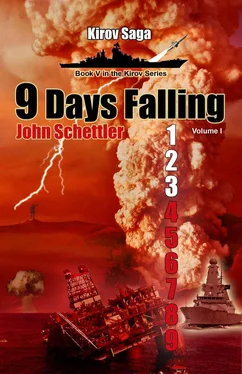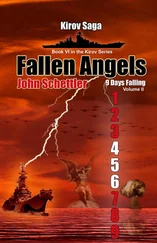The titanium nose of the missile was slim and long, and housed an Argon system radar that allowed it to scan and select specific targets, with a bias toward big lumbering carriers. Behind this was a 1000kg warhead, big enough to do some serious damage, and one of the largest conventional warheads on any anti-ship missile in service. It came from the Soviet mindset where longer, bigger and faster was deemed better, and it was all three, nearly 10,000 pounds of murder on wings, with bad intent. As the salvo completed, one of the sixteen missiles would rise as leader, using its altitude to acquire the distant target. It would pass this data on to the other fifteen at lower altitude, and if this missile were taken out, another would automatically rise to the position of salvo leader as the attack progressed.
Behind the Vulkans came the P-700 Shipwrecks , fat supersonic flying busses that had already challenged the American Task force when fired by the Oscars . Karpov was sending a nice concentrated barrage of twenty-four missiles at the Americans to keep them dancing while he dealt with their final thrust against his fleet coming in from the east.
Then it happened. Another Vulkan got into the fray on the high peak at the northern tip of Iturup Island. SVERT, the Sakhalin Volcanic Eruption Response Team began to register intense seismic activity at 10:40 hours. The Demon had slumbered for 10,000 years in a quiet glacial valley, and no one knew when it had last erupted. Yet over the centuries a massive pool of deep magma had migrated up towards the submerged caldera that formed the gap between the islands, and the area had been restless and grumbling in the last several years. Now the Demon awoke.
Another deep rumble was heard, and Karpov turned to look off his port quarter where the distant silhouette of the island could still be seen on the horizon some thirty kilometers away…until it exploded.
An enormous plume of fire and ash rose into the sky, larger than any eruption in the long island chain since the dawn of the present Holocene epoch, nearly 12,000 years ago. It was to be the largest eruption in recorded history, with fire and ash spewing from the 1.5 kilometer wide crater at the top then blowing it wide open. It was bigger than any geologist believed possible for this region, though they had not fully measured the huge magma chamber building for generations beneath the Kurile subduction zone. Other volcanoes of this type like Vesuvius, Krakatoa, Mt. St. Helens and Pinatubo had demonstrated the vast explosive potential of a stratovolcano. The Demon would trump them all, even besting the massive eruption of Mt. Tambora in 1815.
Karpov covered his ears as the raging sound of the explosive eruption intensified. They felt the ship roll with a blast wave, as though a massive nuclear detonation had ripped the top off the island volcano with an explosion exceeding 1000 megatons of TNT. The roar would be heard throughout all of Japan and Northern China as far away as Beijing, Taipei, and even Manila, over 2500 kilometers to the south. The broiling mass of ash and pumice was seared by tall geysers of molten lava cascading up and then down again to hiss into the boiling sea. Massive volcano bombs, rocks the size of a bus, were hurled up into the atmosphere, some falling like meteors as far as twenty or thirty kilometers away. A steaming red and black column of smoke would eventually climb to a height of fifty-seven kilometers and eject nearly fifty cubic miles of pyroclastic ash and pumice.
Rodenko stared at his radar screen and could not believe what he was seeing. They felt the ship shudder, as much from the wrenching sound as anything else, and Rodenko reported a large signal return wave approaching at nearly 500kph. Karpov turned his field glasses north and saw it coming, a rise of seawater glistening in the morning sun, and all he could think of at that moment was the Mississippi , the old American battleship, the ‘Black Lady’ that he had swamped with a thousand feet of radiated ocean in the North Atlantic.
“All hands! Brace for heavy seas!” His voice seemed high and thin over the welter of sound and fury that was surging at them as the horizon itself seemed to rise up in a massive seething dome. And then the Demon showed its real face, and the whole northern tip of Iturup island, and much of the submerged caldera, exploded in a titanic upwelling of seawater and molten earth.
The shock wave was so powerful that it blew out windows in buildings as far away as Vladivostok, two days sailing time to the west. At Fokino headquarters Admiral Volsky was nearly thrown from his chair. He turned, awestruck, as he saw the angry red glow on the horizon and what looked like a massive mushroom cloud out where the fleet had deployed. His first thought was that the Americans had struck with nuclear weapons.
“My God,” he breathed. “It’s begun.”
“Woe unto you, ye souls depraved!
Hope nevermore to look upon the heavens;
I come to lead you to the other shore,
To the eternal shades in heat and frost.”
~ Dante Alighieri, The Inferno — Canto III
“Certainly there is no hunting like the hunting of man and those who have hunted armed men long enough and liked it, never really care for anything else thereafter.”
~ Ernest Hemingway,
On the Blue Water
Orlovsat in back the truck, thinking what he would do next. The flight east away from the Germans north of Kizlyar had been a quick rumble as the trucks sped along the hard packed earthen road. Half way to the coast, however, the good road ended, and they were forced to turn southeast along narrow tracks that fringed brown muddied fields. They crossed small streams over stone bridges that barely had the width to accommodate the vehicles, and the going was slow. The terrain forced them east towards the Caspian their way south blocked by a sprawling series of marshes, fen pools and salt barrens. Below this, the Terek River wandered lazily over the flat landscape, losing itself in many fingered runs into the marshland.
Orlov was watched by two guards, both with sub-machineguns, but he soon engaged them with his devil may care attitude, and even had one man laughing at one point, before the soldier steadied himself with a sergeant staring at him from the back of the truck bed. He had been all set to blow the Colonel who confronted him to hell; then the Germans attacked and everything became chaos. With six NKVD soldiers around him they were all hustled into a truck and on the road north, leaving a cloud of dust behind them—until they saw the armored cars advancing, with squads of German infantry on their flanks.
The column had to make a hard right turn and head east. The road to Astrakhan was now cut, at least for the time being. Now Orlov wondered what had become of his grandmother. That part of the column was also cut off, so it must have turned south, he reasoned. Good. We’re all going south. The Germans did me a favor after all. Now all I have to do is figure how to bust a few heads, get hold of one of those machine guns and settle affairs here. That Sergeant is the only real threat. He’s a sallow faced bastard, like all sergeants, eh? I’d better figure a way to get him closer. The others will be no problem.
“Hey… Tovarich, I’ve been to Baku already. Why in hell are we going back? I thought you were here to fight the Germans. They’re behind us! Or are you sucking on that Colonel’s teat, eh?”
“Watch your mouth,” the Sergeant growled.
“You watch it, asshole!” Orlov was in no mood to be pushed any further in spite of the circumstances. Amazingly, no one had searched him in the heat of the moment, and he still had the pistol in his pocket!
Читать дальше












